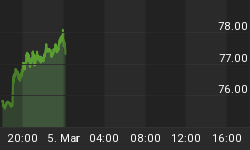Although well off their all-time highs, American stocks are now marginally up for the current year. In the past two months, the markets have recovered over 30 percent from last year's lows. But something just does not add up. In the first quarter of 2009, average U.S. corporate earnings were down over 30 percent. There is once again a serious disconnect between stock prices and economic reality. Perhaps these sleepwalking investors think that the 50 percent sell-off in 2008 was overdone and great bargains are now available. To believe this is to misunderstand the economic hurricane of last October, and the gaping holes in America's hull that it exposed.
In the last quarter of 2008, investors faced a meltdown of the banking system. World governments injected trillions of dollars into their economies and changed accounting rules to ensure that a systemic banking failure was averted. Though the system has stabilized, investors seem to forget that none of the fundamental problems have been solved. We may have survived the initial heart attack, but the system remains wrought with clots.
The epicenter of the global financial system is still found on Wall Street. Despite that immense responsibility, the American economy is failing to restructure and seems to be indulging its traditional vices of over-borrowing and over-spending. Wherever the private sector attempts to correct its behavior, a bloated federal government overrides its efforts.
By diverting trillions of borrowed citizens' dollars into keeping alive vegetative corporations such as AIG, Chrysler, Citi, Fannie Mae, Freddie Mac and GM, the Administration is crowding out new, enterprising companies from access to vital labor and capital resources. Enshrining inefficiency in this manner bodes poorly for the U.S. corporate sector's future capacity to increase profitability. America needs fundamental restructuring in order to compete in an increasingly competitive marketplace. Meanwhile, profitability in those countries that do the hard work of restructuring can be expected to rise disproportionately as the world economy revives.
In the meantime, U.S. banks will face an avalanche of loan defaults and derivative failures. Clearly, the Good Housekeeping Seal of Approval bestowed on many banks through the much-hyped "stress tests" were a politically cynical, confidence-boosting whitewash. Even so, most banks were deemed undercapitalized! This dark thought perhaps explains the Treasury's apparent unwillingness to accept early TARP repayments.
When U.S. corporate earnings fail to keep pace with the blistering ascent of stock prices, look for investors to reconsider their strategy. As they had in the second half of 2008, many investors will once again seek safety above all. But the safe havens of 2008, the U.S. dollar and U.S. government debt, are much more problematic in 2009. Alternatives will be found.
Despite severe downward recessionary forces, the apparent passing of a threatened financial meltdown and worldwide central bank manipulation, the price of gold continues to hold up. Clearly, many investors, including hedge funds, corporations, and even some governments, are taking refuge in history's oldest guardian of wealth.
Most notably, China, the world's largest gold producer, has recently double its central bank's gold reserve. China also floated a preliminary idea at the recent G-20 meetings to replace the U.S. dollar with a gold-linked international reserve currency. This idea may soon catch on among creditor nations who value real money but also want the flexibility to undervalue their paper currency for the benefit of exporters.
It appears that the world is moving quietly but steadily back to the future. The U.S. dollar became the world's reserve currency because, at the time, it was "as good as gold." Through political sleight of hand, the gold backing was withdrawn, leaving the world floating - and now sinking - along with the dollar. This new standard, if implemented, will help rebalance current accounts, re-opening the path to growth for those economies that restructure. Riding on its sense of entitlement, the U.S. is not likely to be one of those economies. Instead, the world's largest debtor nation will suddenly confront the true weight of its obligations and be forced to significantly lower its standard of living.
As a result, the return of gold as a international reserve should not leave investors optimistic about a U.S. stock recovery. Those that are sleepwalking into this rally will have a rude awakening when they realize that the dollar has brought down the ship. Their more prudent neighbors will have already departed for the bedrock of real wealth: a healthy reserve of gold.
For a more in-depth analysis of our financial problems and the inherent dangers they pose for the U.S. economy and U.S. dollar, read Peter Schiff's newest book "The Little Book of Bull Moves in Bear Markets." Click here to order your copy now.
For a look back at how Peter predicted our current problems read the 2007 bestseller "Crash Proof: How to Profit from the Coming Economic Collapse." Click here to order a copy today.
More importantly, don't wait for reality to set in. Protect your wealth and preserve your purchasing power before it's too late. Discover the best way to buy gold at www.goldyoucanfold.com. Download Euro Pacific's free Special Report, "Peter Schiff's Five Favorite Investment Choices for the Next Five Years", at http://www.europac.net/report/index_fivefavorites.asp. Subscribe to our free, on-line investment newsletter, "The Global Investor" at http://www.europac.net/newsletter/newsletter.asp. And now watch the latest episode of Peter's new video blog, "The Schiff Report", at http://www.europac.net/videoblog.asp.















